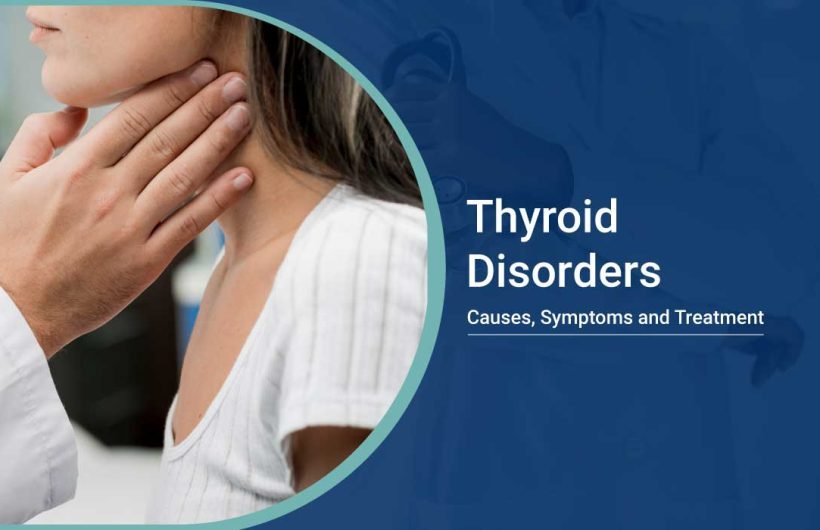The thyroid gland is a butterfly-shaped endocrine gland located in the neck that produces hormones that regulate metabolism and control the body’s energy production. Thyroid disorders occur when the thyroid gland produces too much or too little hormone, leading to various symptoms and health problems. Thyroid problems can come in a variety of forms, including:
- Hypothyroidism: A condition in which the thyroid gland produces too little thyroid hormone, leading to symptoms such as fatigue, weight gain, constipation, rapid heartbeat, depression, dry skin, anxiety, and irritability
- Thyroid nodules: Abnormal growths or lumps that form on the thyroid gland. They can be benign or malignant and may cause no symptoms or interfere with thyroid function
- Thyroid cancer: A type of cancer that develops in the thyroid gland, which can be cured if detected at an early stage
- Thyroiditis: Inflammation of the thyroid gland, which can cause temporary or permanent damage to the thyroid gland and affect hormone production
Thyroid disorders can be diagnosed through blood tests, imaging studies, and biopsies and are typically treated with medication, surgery, or radioactive iodine therapy. It is important to consult with a healthcare provider if you suspect you may have a thyroid disorder, as early diagnosis and treatment can help prevent complications and improve quality of life.
Causes of Thyroid
The causes of thyroid disorders depend on the specific type of disorder. Below mentioned are some common causes for each type:
Hypothyroidism:
- Autoimmune thyroiditis (Hashimoto’s thyroiditis): It refers to a condition in which the body’s immune system attacks the thyroid gland
- Radiation therapy to the neck or head
- Thyroid surgery can damage or remove the thyroid gland
- Congenital hypothyroidism: It refers to a condition that is present at birth in which the thyroid gland does not develop properly
- Certain medications, such as lithium or amiodarone
Hyperthyroidism:
- Graves’ disease: A condition in which the body’s immune system produces antibodies that stimulate the thyroid gland to produce too much hormone.
- Toxic multinodular goiter: An enlargement of the thyroid gland that contains several nodules, some of which produce too much hormone.
- Thyroiditis: Inflammation of the thyroid gland that can cause the gland to release too much hormone.
- Thyroid cancer: In rare cases, thyroid cancer can cause the gland to produce too much hormone.
Thyroid Nodules:
- The cause of most thyroid nodules is unknown, but they are more common in women and older individuals
- Radiation exposure may increase the risk of developing thyroid nodules
Thyroid Cancer:
- The cause of most thyroid cancers is unknown, but it is more common in women and in individuals who have had radiation exposure to the head or neck
- Certain genetic mutations may also increase the risk of developing thyroid cancer
Thyroiditis:
- Autoimmune thyroiditis: A condition in which the body’s immune system attacks the thyroid gland, leading to inflammation and damage
- Viral infections or other immune system disorders may also cause thyroiditis
- It is important to note that some thyroid disorders, such as autoimmune thyroiditis and some types of thyroid cancer, may have a genetic component and may run in families
Thyroid Symptoms
The symptoms of thyroid disorders vary depending on the specific type of disorder. Here are some common symptoms for each type:
- Hypothyroidism
- Fatigue
- Weight gain
- Cold intolerance
- Constipation
- Dry skin
- Hair loss
- Depression
- Memory problems
- Menstrual irregularities
Thyroid Treatment
The treatment for thyroid disorders depends on the specific type of disorder and the severity of the condition. Here are some common treatments for each type:
- Hormone replacement therapy: The most common treatment for hypothyroidism is daily hormone replacement therapy with synthetic thyroid hormone, such as levothyroxine
- Hyperthyroidism Antithyroid medication: Medications such as methimazole and propylthiouracil can reduce the production of thyroid hormone
- Radioactive iodine therapy: A single dose of radioactive iodine is given orally, which is taken by the thyroid gland and destroys the overactive cells
- Surgery: Surgery to remove part or all of the thyroid gland may be necessary
- Observation: Observation may be recommended if the nodule is small and not causing symptoms
- Fine needle aspiration biopsy: A needle is used to remove a small sample of cells from the nodule to determine if it is cancerous or benign
- Surgery: The most common treatment for thyroid cancer is surgery to remove part or all of the thyroid gland
Conclusion
When seeking treatment for a thyroid disorder, it is important to find a qualified healthcare professional knowledgeable and experienced in diagnosing and treating thyroid disorders. It may include an endocrinologist and a specialist diagnosing and treating hormone-related conditions, including thyroid disorders. Dr. Moxit Shah is a specialist Endocrinologist at the Vishuddha Hospital in Ahmedabad.







